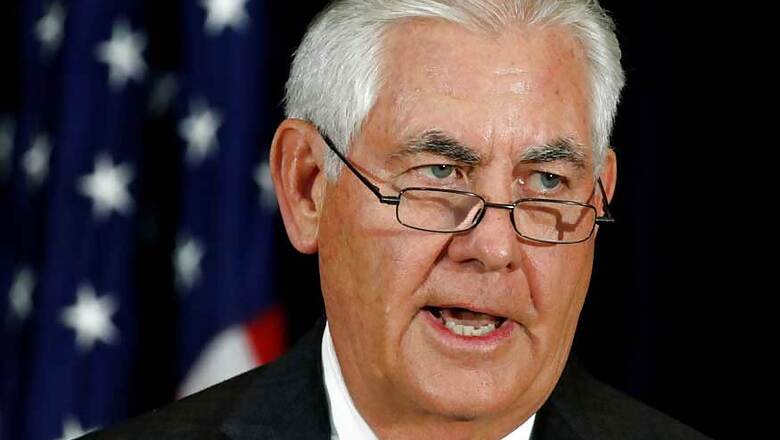
views
United Nations: US Secretary of State Rex Tillerson on Friday urged North Korea to carry out a "sustained cessation" of weapons testing to allow the two countries to hold talks about Pyongyang's nuclear and missile programs.
"North Korea must earn its way back to the table. The pressure campaign must and will continue until denuclearization is achieved," Tillerson told a meeting of the United Nations Security Council on North Korea's weapons programs. He did not specify how long the lull should last.
He told reporters after the meeting that the United States would not accept any preconditions for talks with North Korea.
Tillerson had raised hopes this week that the United States and North Korea could negotiate to resolve their standoff when he said that the United States was “ready to talk any time North Korea would like to talk."
But the White House distanced itself from those remarks by Tillerson and said that now is not the time for negotiations.
North Korea's ambassador to the United Nations on Friday made no mention of Tillerson's call for a halt to testing when he addressed the same UN meeting.
Ambassador Ja Song Nam said his country would not pose a threat to any state, as long as its interests were not infringed upon.
He described the Security Council session as "a desperate measure plotted by the US being terrified by the incredible might of our Republic that has successfully achieved the great historic cause of completing the state nuclear force."
LITTLE INTEREST
North Korea has made clear it has little interest in negotiations with the United States until it has developed the ability to hit the US mainland with a nuclear-tipped missile, something most experts say it has yet to prove.
North Korea conducted missile tests at a steady pace since April, then paused in September after firing a rocket that passed over Japan's Hokkaido island.
But it renewed tests in November when it fired a new type of intercontinental ballistic missiles (ICBM), the Hwasong-15, which flew higher and further than previous tests.
Japanese Foreign Minister Taro Kono told the Security Council that North Korea was "nowhere near ready" to abandon its nuclear and missile programs and was not interested in a meaningful dialogue. He said any lull in missile tests did not mean that North Korea was sitting idly.
“The latest launch was conducted 75 days after North Korea’s provocations in September. Some optimistic views labelled 75 days of silence as a positive signal. However, the missile launch in November made it clear that North Korea was continuing to relentlessly develop its nuclear and missile programs even while they were seemingly silent," Kono said.
Tillerson also urged China and Russia on Friday to increase pressure on North Korea by going beyond the implementation of UN sanctions but the two countries were wary of the idea.
China’s Deputy UN Ambassador Wu Haitao said all parties must implement UN sanctions, but added that unilateral sanctions undermine the unity of the Security Council and “hurt the legitimate right and interests of other countries and should therefore be abandoned."
Russian UN Ambassador Vassily Nebenzia said Moscow was committed to implementing UN sanctions on North Korea and echoed China's concerns about unilateral sanctions.
US President Donald Trump wants China, North Korea's main ally and trading partner, to impose an oil embargo on Pyongyang, over and above Beijing's adherence to UN sanctions.
The Security Council has ratcheted up sanctions on North Korea over its weapons programs since 2006.
UN Secretary-General Antonio Guterres told the Security Council on Friday it was time to immediately re-establish and strengthen communication channels with North Korea, including inter-Korean and military-to-military channels, to reduce the risk of a misunderstanding escalating into conflict.


















Comments
0 comment